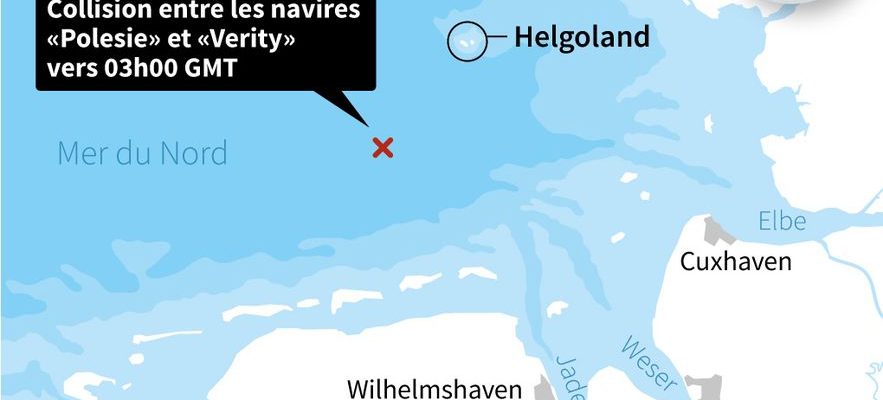A collision between two cargo ships on Tuesday October 24 in the North Sea left one dead and four missing – crew members – while the sending of divers to the wreck of the ship which sank did not make it possible to recover them. locate, according to the emergency services. German maritime rescue announced the end of the search the next day, considering that there was no longer any hope for the missing people.
Off the island of Heligoland, this collision sent one of the two ships involved to the bottom – a rare event. It was the smaller of the two, the “Verity”, 91 meters long and 14 meters wide, on which there were seven people, which sank. This British-flagged cargo ship had left the German port of Bremen and was heading to Immingham, Great Britain. The other ship involved, the “Polesie”, docked in Cuxhaven, in north-west Germany, around 4 a.m. on Wednesday, after having participated in rescue operations the day before.
Unlike the Verity, the Polesie, which according to the German Society for the Rescue of Shipwrecked Shipwrecks had 22 people on board, was only slightly damaged. The crew was not injured. The reasons for the collision of the two cargo ships in the German bay remain unclear.
Collision in the North Sea
© / afp.com/STF
1,300 m3 of fuel on board
Beyond the dramatic human toll, are there risks for the environment? The Verity was loaded with steel rolls and had around 1,300 m3 of fuel on board, said Robby Renner, head of the Cuxhaven rescue services (northwest Germany), who did not rule out “a danger to the environment. “It is not currently possible to predict the consequences of this collision for the environment,” specifies the German media. the TagesschauThe sea rescue teams clearly indicated that it was ‘impossible’ to combat the spread of oil in the evening.”
German news radio NDR Info journalist Laura Albus reported from Heligoland that she received information in the evening that marine diesel had leaked during the accident and was now floating on the surface of the sea “The question now is: where is he going?” she asked tagesschau24.
A major maritime accident in August
A “remarkable” number of pollution incidents have been observed in the North Sea in recent weeks, the Royal Belgian Institute of Natural Sciences (RBINS) warned in a press release in July. Several ships were caught in the act of dumping hydrocarbons and vegetable oil. In addition to these bad practices, the North Sea was the scene, at the beginning of August, of a major maritime accident, off the coast of the Netherlands: a cargo ship caught fire with hundreds of electric cars on board and the Fire raged for days.
The boat was finally able to be towed to a Dutch port. The emergency services had avoided an ecological disaster near the Wadden Sea, classified as a world heritage site by UNESCO, particularly for the richness of its fauna and flora.
According to latest report from insurer Allianz published in May, collisions were the second cause of incidents involving cargo ships on the world’s seas in 2022, accounting for 280 collisions out of a total of more than 3,000 incidents. But few collisions are serious enough to result in the loss of the boat: 38 cargo ships were fatally damaged last year, 4 due to collisions.
The shipping channels around Heligoland are not normally considered particularly dangerous. Accidents are relatively rare: an incident of the magnitude of Tuesday’s collision has not been observed for years.
